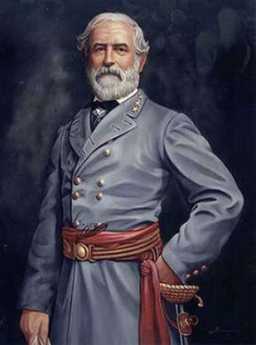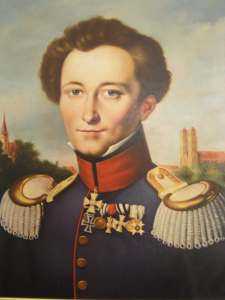Related Topics
Pacifist Pennsylvania, Invaded Many Times
Pennsylvania was founded as a pacifist utopia, and currently regards itself as protected by vast oceans. But Pennsylvania has been seriously invaded at least six times.
Right Angle Club 2009
The 2009 proceedings of the Right Angle Club of Philadelphia, beginning with the farewell address of the outgoing president, John W. Nixon, and sadly concluding with memorials to two departed members, Fred Etherington and Harry Bishop.
Thinking About Thought
There's a yawning gap between concepts of the mind, and concepts of brain function.
Principles of the Command of War

|
| General Robert E. Lee |
COMPUTER war games now consume a great deal of time which teenaged boys ought to be spending on homework, but study of the underlying principles of commanding an army is a major part of the serious curriculum at West Point. To be good in this course means promotion in the officer corps, and putting principles into successful action creates a few famous heroes for the history books. Lawrence E. Swesey, the founder and president of American Military Heritage Experiences, recently fascinated the Right Angle Club with an analysis of Generals Lee and Grant, both West Point graduates, putting the principles to work in the Civil War. Conclusion: Grant was the better general. It was Henry Adams, the manic-depressive historian, who diverted attention away from the principles of war, to such issues as Grant's short stature, taste for whiskey, and poor performance as an Ohio farmer. To be snide about it, a case can be made that Grant was a better writer of history than Adams, as well as a better general than Lee. However, probably neither Ulysses Grant nor Julius Caesar would be considered great historians if either had lost the wars they so famously described.

|
| Carl von Clausewitz |
The nine principles of war used by the American military derive from the Prussian officer Carl von Clausewitz, and are also used by the British, who add Flexibility as a tenth. The Chinese and Russians go on to add Annihilation to their list, a thought worth pondering. French military schools base their training on 115 principles laid out by Napoleon, which are presumably ten times more difficult to remember in the heat of battle if indeed anyone can remember anything when the enemy starts taking aim. In any event, the first universally agreed principle is to have an objective that is both effective and achievable. The second is deciding to take offensive or defensive action, the third is to apply sufficient combat mass at one critical time and place. Maneuver is the last of the four main principles. The economy of force, Unity of command, Surprise, Security, and Simplicity are five lesser principles, used to achieve the four main ones. Using these lines on the scorecard, how did Robert E. Lee and Ulysses S. Grant score on the fifteen major battles of the Civil War?
To compare the two generals, there is the difficulty that they only opposed each other in five battles, and each was the clear winner in two of them. In the battles where they faced other generals, both Lee and Grant won some, mainly because the opposing general did the wrong thing and lost the battle. The score comes out roughly even and gets complicated when giving more weight to winning bigger battles, less weight to smaller ones. Lee gets more glamor, because his style was to attack, even attacking just after he seemed to be losing. Lee won one battle when he was outnumbered, two to one.
But Grant won the war, and that should count for something. Both Lee and Grant knew the superior resources of the North would ultimately overcome the South unless the North made some mistakes, or just got tired and quit. Apparently Lincoln also understood this, and immediately offered the top job to Grant after an interview in which Grant came right out and said so.
Apparently, there is one more principle of war that isn't on the list. You play the hand you are dealt, after counting your cards carefully. In contract bridge, the game is always played with fifty-two cards. It isn't that simple in a war, where you stack the deck if you possibly can.
Originally published: Monday, August 24, 2009; most-recently modified: Monday, June 03, 2019